Contents
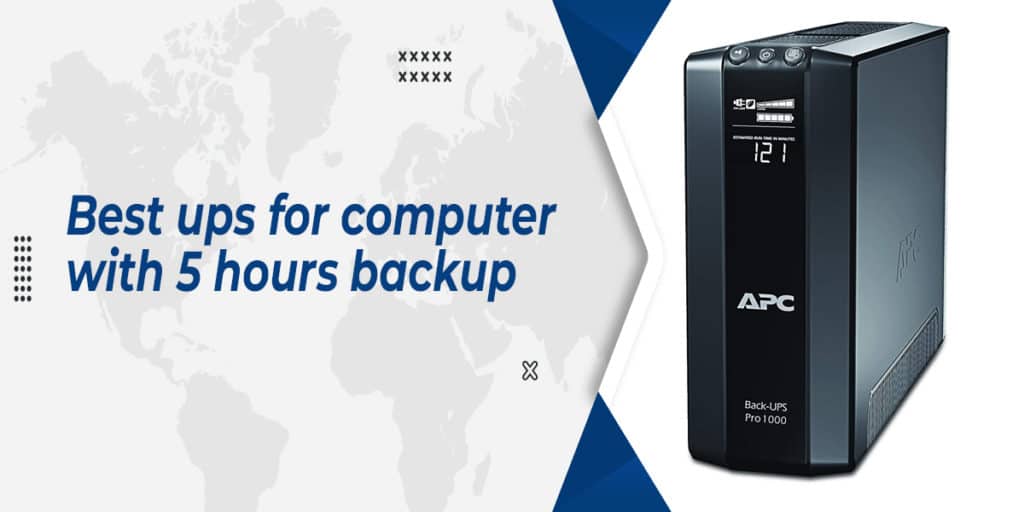
Looking for the best ups for computer with 5 hours backup? Read on to know more.
It might be a lifesaver for your rig if you live somewhere susceptible to blackouts or power surges, and it also protects against minute variations in outlet power.
The best ups for computer will ensure that your PC runs on the electrical equivalent of Premium Unleaded as long as it’s combined with one of the best power supply units for PC.
If you lose control, the UPS has enough juice stored in its internal batteries to provide a steady stream of power for a limited time—enough time to save your work or get to a save point before safely shutting down your PC.
It also serves as a surge protector, which gives you added peace of mind—you don’t want your Nvidia Geforce RTX 30-series GPU to be zapped, particularly because replacing it is nearly impossible at this stage.
Since power cuts in India are so frequent, an inverter is a must-have appliance to get an uninterrupted power supply. In general, people do not connect computers or ACs to the inverter. They are instead using UPS (Uninterrupted Power Supply) for the systems.
An uninterruptible power supply, or UPS (which is how we’ll refer to them from now on), is, at the most basic level, a big battery that kicks in when your power goes out.
They range from really small units to whole-house units. We’re going to focus on testing smaller, desktop models that give you enough power for a desktop PC, and leave the whole-house models to other experts.
With all of that out of the way, if you feel you need a UPS, just buy the APC Back-UPS Pro 1500VA. It’s got a big enough battery so you can save your work and safely shut down without having to panic.
Best UPS For Computer With 5 Hours Backup
Best UPS for PC – Uninterrupted Power Supplies from a great selection at Computers & Accessories Store. Uninterruptible power supplies are an often-overlooked aspect that is crucial in the construction of a high-end gaming PC.
It might be a lifesaver for your rig if you live somewhere susceptible to blackouts or power surges, and it also protects against minute variations in outlet power.
A strong UPS will ensure that your PC runs on the electrical equivalent of Premium Unleaded as long as it’s combined with one of the best power supply units for PC.
1. Best Overall: APC Back-UPS Pro 1500VA
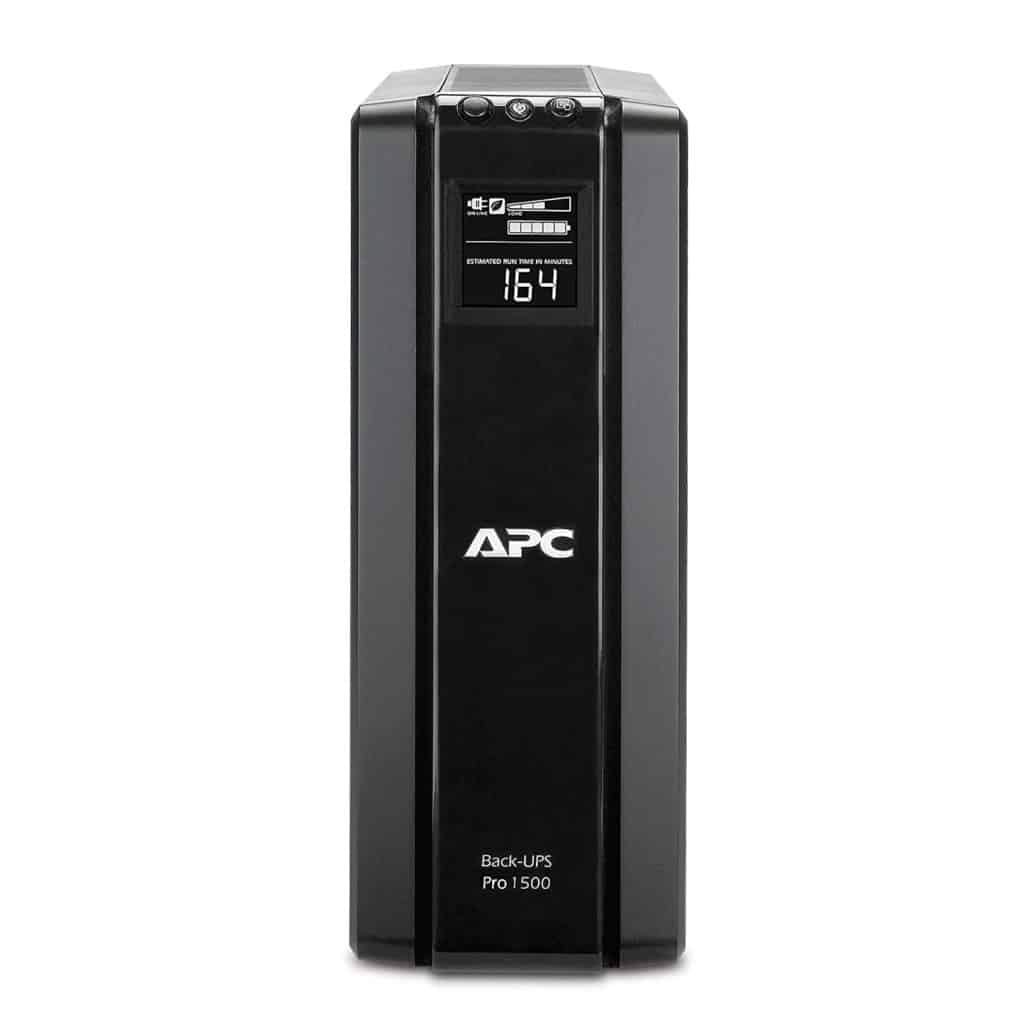
Our reviewer, Jeremy, tested the APC Back-UPS Pro 1500 with his own equipment (a desktop computer and monitor) and found it had more than enough power to allow him to wrap up what he was doing, save all of his work, and properly shut down his computer.
While this APC model has 10 outlets, only five of them are connected to the battery (the other five do have surge protection, though).
We feel five outlets are plenty and should cover most setups adequately (more so, really). This unit is vertically oriented, so while it doesn’t have a large footprint, it will resemble a computer tower.
You could buy this one without reading the rest of our list and know you got a solid, reliable unit.
Pros
- LCD
- Numerous outlets
- Small footprint
- Hot-swappable batteries
Cons
- No USB Port
- Large and in charge
2. Tripp Lite AVR750U UPS Battery Backup
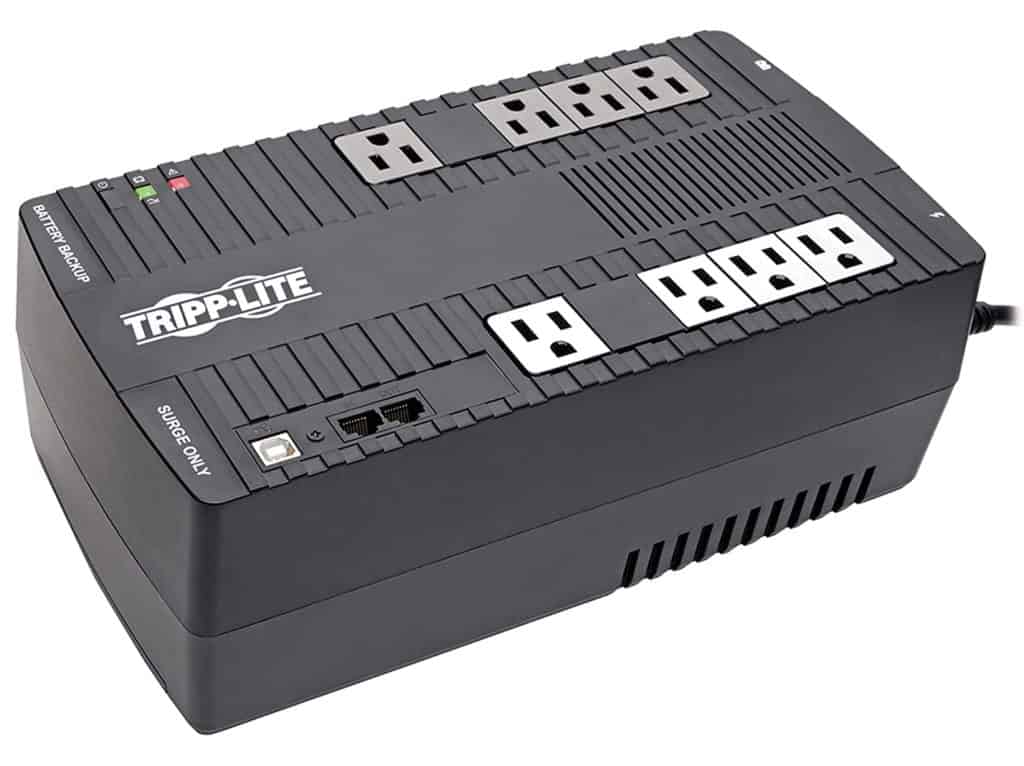
The Tripp Lite AVR750U is an affordable unit for very modest uses. Despite its smaller battery, the Tripp Lite will still give you enough time to save your work and shut down safely.
Keep in mind: If you decide to go this route, the Trip Lite lays on the floor horizontally, so it takes up more space than you might be used to.
Pros
- Lots of outlets
- Inexpensive
Cons
- Documentation is sparse
3. APC Back-UPS 425VA
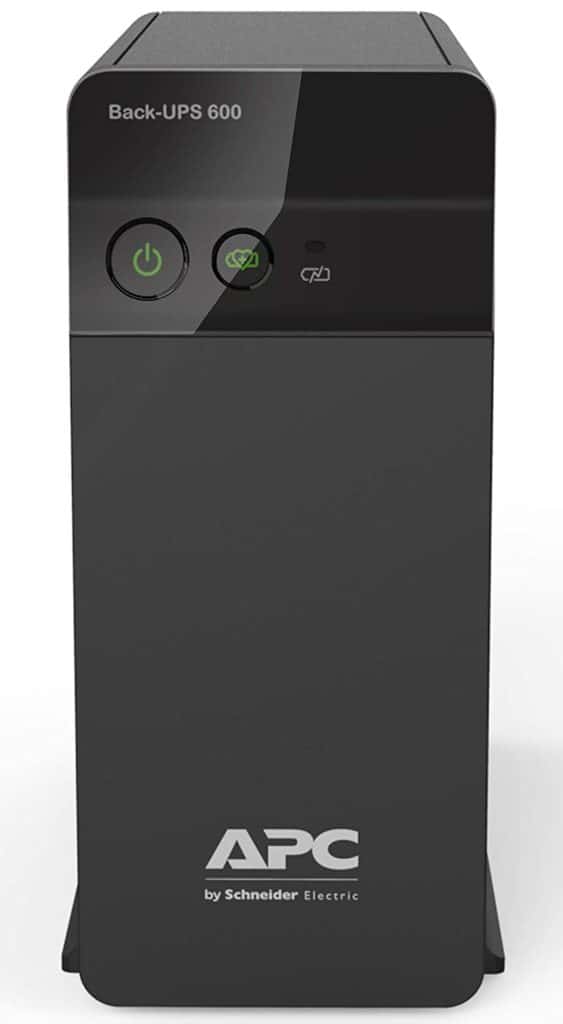
The APC Back-UPS 425VA UPS is our favorite budget option, and not only because of the clever name. The Back-UPS is designed to keep some low-power devices online when the power goes out. It won’t keep a desktop PC going, but it can keep you connected when you need it the most.
It’s small enough to keep on your desk if you want. There’s no LCD screen, which is something we always like to see on a UPS, but if you have just a few smaller devices to power, this UPS can get the job done.
Pros
- Easy to use
- Small footprint
- Inexpensive
Cons
- Low power output
- No LCD screen
4. CyberPower EC650LCD
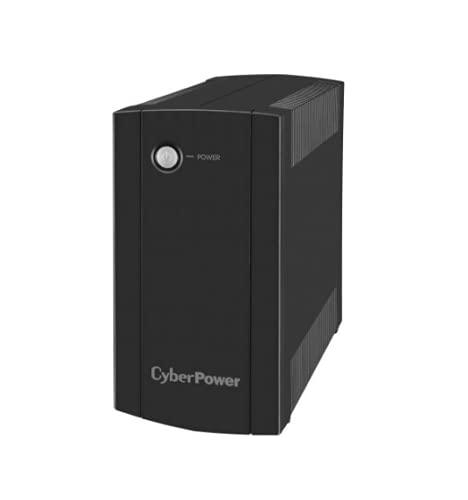
For smaller accessories and network equipment, the CyberPower EC650LCD is the best pick for most. Coming in at just over $70 for 390W/650VA, the EC650LCD has enough power reserves to keep the average home network alive for well over 15 minutes, which is enough time to exit your game/applications, save all your work through the network, and shut everything off gracefully during a power outage.
The EC650LCD is small enough to hide away, taking up very little desktop room for a 390W unit. One of my favorite features of the EC650LCD is its array of ECO ports.
These ports can be managed and timed to turn on or off, depending on your schedule or use case. The ECO ports will also power down accessories like your speakers and display if your PC is asleep or powered down.
Pros
- Good power reserves for its size
- LCD screen for load monitoring
- ECO mode for outlet management
Cons
- Won’t power high-end systems
5. APC BE700Y-IND 700VA Back-UPS
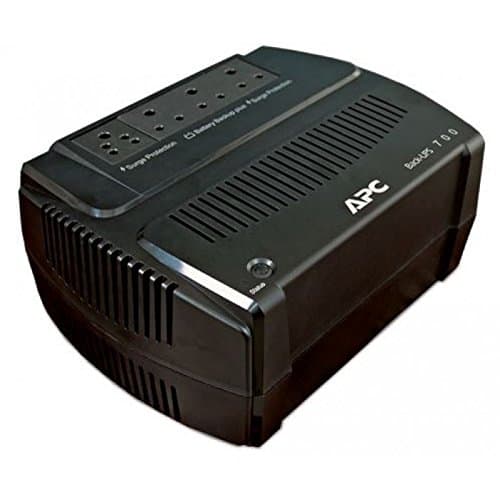
This is one of the best budget UPS for Computers in India as it comes with good battery backup and overload protection. The UPS comes with 3 battery packs with surge-protected sockets and 1 separate surge-protected outlet.
The output capacity of this UPS BE700Y is 700VA or 390 watts. There is a built-in AVE feature that helps in regulating the input voltages and provides an output at optical ranges.
There is an LED display unit with audible alarms that indicate all the notifications of your UPS system. It comes with 2 years manufacturer warranty.
Pros
- Good 30 minutes of backup for all-in-one PC
- 3 battery backed surge protected sockets
- 1 surge-only socket
- Built-in AVR feature
- Overload protection
Cons
- The fan is a bit noisy at times
6. Microtek 1000VA UPS for PC
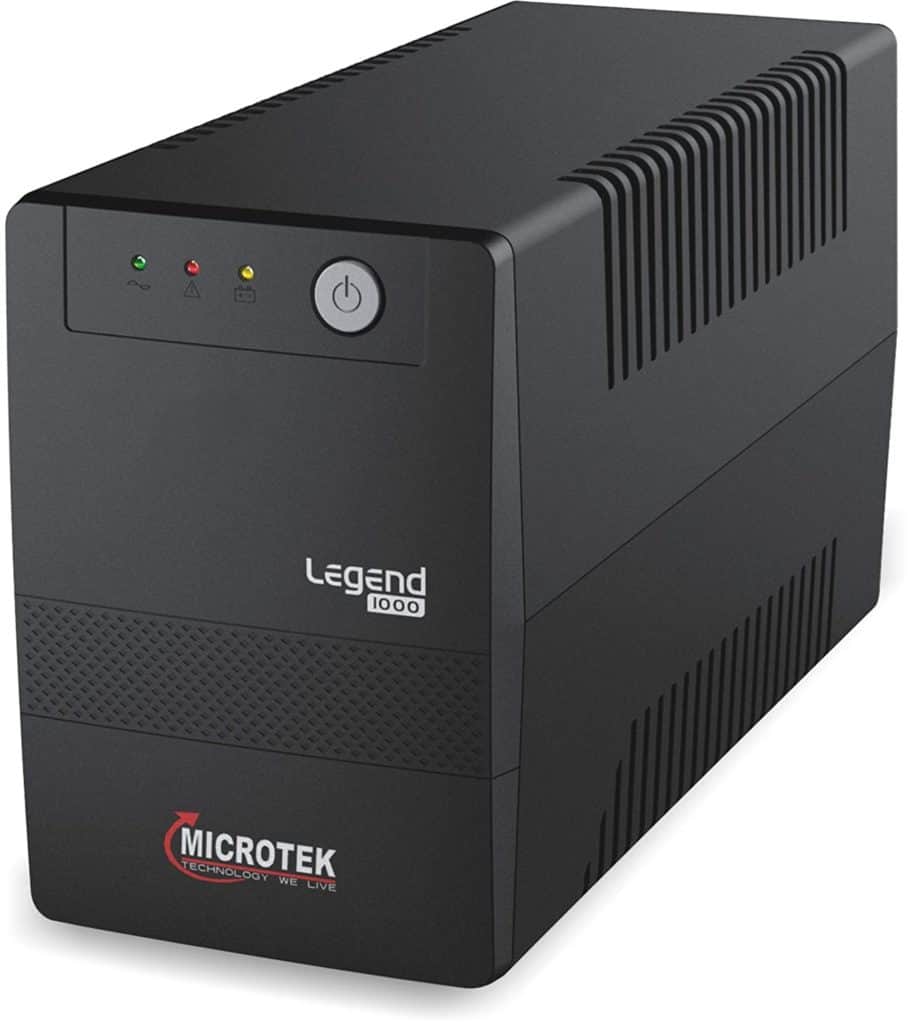
Microtek is another reputable brand when it comes to power management systems in India.
This Microtek UPS comes with a capacity of 1000VA and can run for more than 40 to 45 minutes when a single PC is connected. The UPS is a cable of tackles input voltages in the range of 135 to 300V and can also protect the system in case of sudden voltage surges/drops.
The optimal output voltage is 230 volts. So, it can be used to connect 2 PCs simultaneously. It takes around 2 hours to get fully charged, which is less compared to the similar models in the same price segment. You get 2 years of warranty on the product.
Pros
- Runs for 40-50 minutes for a single PC
- Supports 2 PCs at a time
- Can handle voltage fluctuations
- Faster charging time
- 3 output sockets
Cons
- Little heavy
7. V-Guard Sesto Dx 600VA Desktop UPS
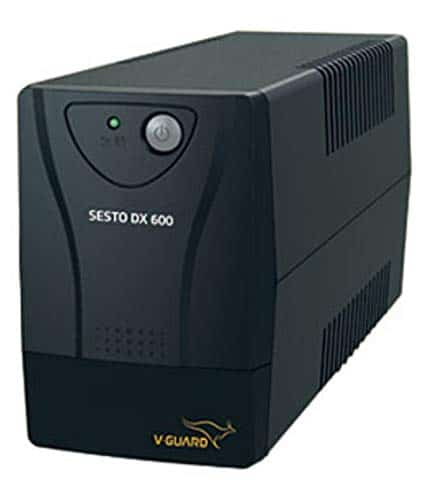
V-Guard is the name that is familiar to most Indian households when it comes to Stabilizers for refrigerators and TVs.It is compact and comes with a capacity of 600VA or 360 Watts.
It gives a decent battery backup of 10 to 15 minutes for a single PC. The other features include – Intelligent No Load Shutdown, Overload protection, and Off mode battery charging. You get a warranty of 2 years on the products with amazing customer support from V-Guard.
Pros
- Most trusted brand for Indians
- Runs for 10 to 15 minutes for a single PC
- Built-in ZPD technology
- LED indicators with a special alarm
Cons
- Works with regular printers but not with a laser printer
8. Microtek Tuff Power Pro+ 650VA UPS
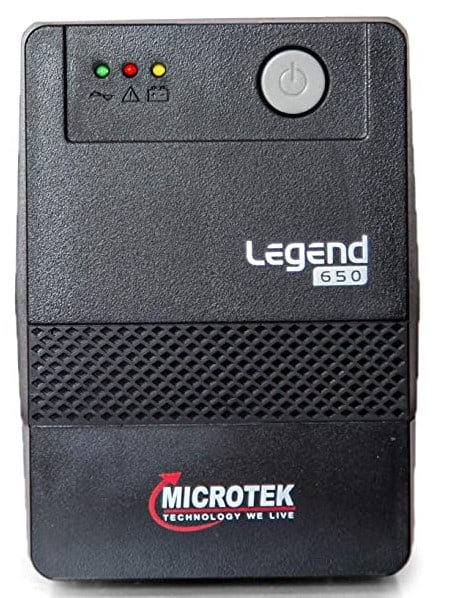
The Microtek Tuff is another great choice for home PC users with regular usage requirements.
The UPS comes with a capacity of 650VA and is capable of handling voltage fluctuations in the range of 140 to 300 Volts. The other features include – Cold start function, long battery life, AVR stabilization, sealed battery, 3 output ports, etc… You get up to 2 years of warranty on the product.
Pros
- Budget-friendly
- Good run time of 20 to 30 minutes for 1 PC
- Boost and Buck AVR-For Voltage Stabilization
- 3 Output Ports
- Overload and Discharge Protection
- Auto Restart
Cons
- Non-replace
Best UPS For Computer – Buyer’s Guide
The main consideration is how much time you need to get your hands on your inventory. A quick look at our chart will tell you which package type is best for your needs. If you are a small business or someone who just starting, consider our Small Business Select Package.
Because even though an SSD is faster than a hard drive, it is still, in many cases, not fast enough to keep up with the rapid-fire typing and other activities you will want to engage in on your computer.
Types of UPS for PC
Different types of UPSs for PCs differ in the way they move power. For a LED TV the type of UPS you need to install is different from a PC. Here are the three main types of UPSs for PCs.
Standup by
Standby-up power supplies (aka “batteries”) are one of the most overlooked components of any successful backup or disaster recovery plan.
This is particularly true for small to medium-sized businesses, which often don’t even have the manpower or expertise to evaluate this vital element of their DR/BD strategy.
Don’t go getting angry at the manufacturers just yet. You see, there’s no need to panic, most small to medium-sized companies (even those without a full-time IT person) don’t need a battery farm to run their computers for more than a few days without a plug. Many times, a business can get by with a single battery – for weeks or even months!
Simply put, it keeps your business flowing and functioning even when “things” get bad. It gives you time to restore from backup and get back on your feet. And it provides you with the peace of mind that comes from knowing your computers will be ready to rock when you are.
Line-interactive Ups
The advent of the Internet has given rise to a new breed of power user – the online entrepreneur. More and more people are making a good part (or maybe even their entire income) via the Internet.
These folks have high energy, a high need for speed, and they often have a difficult time accepting “the system” as being inherently fair.
They want to be in complete control of their destiny and are willing to do whatever it takes – including spending huge wads of money – to get what they want.
This group is extremely sensitive to downtime and sluggish performance, and they expect immediate results without delay.
Online entrepreneurs also have a lot of downtimes. A lot of it. Between surfing the ‘Net, dealing with email, and managing their websites, these people are sitting ducks for downtime-induced failure.
The problem is exacerbated by the fact many of them use low-end, low-quality, cheap web hosting services. These service providers are only too happy to keep your site down as long as they can get away with it – often for no good reason whatsoever.
Some of these companies seem to consider “downtime” to be an unavoidable evil, which they must endure as part of doing business online.
Not so with Line-Interactive UPS. As you shall soon see, Line-Interactive provides multiple levels of protection against total system downtime for its users. This gives the user the ability to perform tasks without fear of interruption, and it also gives the user the confidence he or she has a backup plan just in case the primary source of power fails.
Online Ups
That would automatically refresh the page every 10 seconds or so – just like your computer does when it needs more power.
The difference is your “online UPS” would do it automatically, in the background, while you were surfing the ‘Net or checking your email.
What would you get for your money with an online UPS? Well, for one thing, you’d get a dramatic increase in the percentage of people who visit your site who click on the links you have posted.
And, if they do click, they’ll get a much quicker load time too. This means they’ll be back to check out your other pages, and hopefully, they’ll become a customer.
Line-interactive Power Requirements
Most likely, you already own a line-interactive power supply. However, even if you don’t, you can get one inexpensively. You should consider getting one anyway – even if you’re not using with Line-Interactive.
The answer is simple. As I said earlier, many web hosting providers are only too happy to keep your site down as long as they can get away with it. And that usually happens when your site is experiencing a lot of traffic.
Types Of Batteries
There are two types of batteries used in Uninterruptible Power Supplies or UPSs. These are typically called “Primary” and “Secondary” batteries.
Lithium-ion Batteries
Lithium-ion (Li-ion) batteries are the most widely used type of rechargeable battery in the world. They are commonly used in digital cameras, MP3 players, cell phones, laptop computers, and many other portable electronic devices.
These batteries have the highest energy density per unit weight of any battery chemistry. This means they have the greatest capacity to store energy about their size and weight. Lithium-ion batteries are also very safe when used as directed.
However, they can overheat or even catch fire if mishandled or installed improperly. Therefore, it is very important to use only those instructions that came with your battery pack and pay close attention to any warnings printed on the package. Follow all instructions and warnings to the letter.
Best UPS For Computer With 5 Hours Backup – FAQs
How Long Will A Ups Last?
An uninterruptible power supply that rates at 1500VA should run your computer for a little under an hour. But if you’re trying to run your PC and your monitor from it, then you’re probably looking at more like ten minutes of up-time.
A 650VA, at peak load, will maybe net you something in the range of seven minutes, though that is obviously with a far lower peak wattage.
What Type Of UPS Should I Buy?
There are two types of uninterruptible power supply to look out for when shopping around for your gaming PC: sine-wave and simulated sine-wave.
Sine-wave UPS backups deliver a smooth, consistent oscillation of AC power directly to your PSU. These are often the only type of UPS you’ll find recommended for gaming PCs due to their efficiency and clean power delivery.
What’s The Difference Between Sine-wave And Simulated Sine-wave Ups?
A pure sine-wave signal will be a match for the AC mains power your PSU is expected from your mains. Essentially, your PC shouldn’t know the difference between your UPS battery power and the power coming from the wall.
Simulated sine-wave UPS deliver a stepped, approximated waveform using pulse-width modulation (PWM). That’s the same concept used to control PC case fan RPM.
These are often far less expensive than pure sine-wave UPS and can be useful for peripherals, small devices, and monitors. However, since the waveform is not always exact, these may not function as intended with PSUs that demand a stable and consistent input.
When your UPS detects a power surge or cut it will switch to battery power. How it delivers that battery power to your PC or accessories is when sine-wave versus simulated sine-wave matters most.
That’s because some PSUs will actually recognize a simulated sine-wave frequency and shut down suddenly to protect themselves from the unexpected oddity in power. Thus, your UPS won’t be saving your PC from a loss of power.
Conclusion
Gamers need a good power supply too, just like everyone else. But for the uninterrupted gaming experience, a powerful PS is very essential. It gives you time to perform or at least allows you to save your game.
More importantly, it comes with a higher price range. Whether the power supply you are looking for is a normal one or powerful enough to support your gaming PC parts, you must choose the best one that can deliver enough amount of power to at least save your document or file.
We’ll be glad if you comment in our comment box and share your views on best ups for computer with 5 hours backup. This is often a false claim that people make, but it’s important to know what you’re getting into when buying a battery-operated timer.
